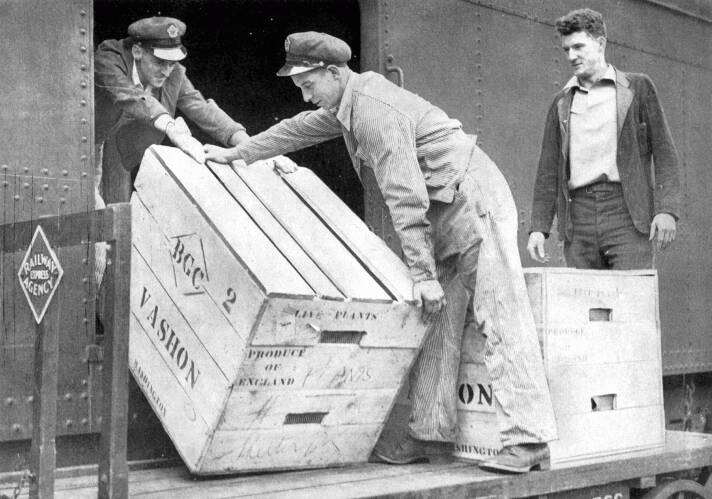 Unloading an Express Shipment
Unloading an Express Shipment
For more than a century the word EXPRESS has stood for speed—speed
and romance. In 1839, William F. Harnden, one of the pioneer railroad
conductors of New England, had an idea. The idea took hold of
him so strongly that he quit his job with the railroad and devoted
himself to the business of putting it to work. He became the world's
first express messenger, traveling between Boston and New York
by the fastest conveyances of that day, carrying a carpet bag.
The carpet bag contained packages of money, documents, jewelry,
gold and other valuable and articles entrusted to his care.
Gradually Hamden's express business expanded. The carpet bag
became inadequate, and in time a railroad car was needed to hold
all of the things that people wanted him to carry for them.
With the growth of railroads and the rapid development of the
country, other express companies entered the field. Wells-Fargo,
the pioneer express company of the Far West, the famed Pony Express,
Adams Express, American Express and many others—each provided
service by the fastest conveyances of their day.
The successor to all of these famous express services of earlier
days is the Railway Express Agency. Its far-flung organization
surpasses in scope of operations all of the forementioned express
companies combined.
Performing complete pick-up and delivery service, collecting
shipments from homes, offices, factories and other places of business
and delivering them to the doors of consignees in important cities
and towns in all parts of the country, Railway Express Agency
handles an average of more than 400,000 separate shipments, large
and small, every day in the year.
In the performance of its extensive nation-wide service, the
Agency maintains 23,000 offices scattered throughout the United
States. It uses more than 201,000 miles of railway lines, 21,000
miles of steamship lines, 41,000 miles of air lines, and 14,000
miles of motor-truck lines in its regular daily operations.
For the collection and delivery of express shipments, the Agency
operates a fleet of 13,000 motor vehicles of its own—the
largest commercial motor fleet in the United States under one
management. Altogether, the Agency employs 57,000 express handlers,
agents, messengers, pick-up and delivery truck drivers, inspectors
clerks and other workers. Through its connections, the Agency
provides a world-wide express service, receiving shipments from
and forwarding shipments to many foreign countries.
In addition to millions of express shipments in packages, crates,
cases, boxes, cartons, bags and other containers, the Agency operates
refrigerator cars for the transportation of perishables, specially
built cars for the transportation of race horses and animals,
and specially built tank cars for the transportation of live fish.
It handles shipments of valuables, motion picture films, delicate
instruments, plants and flowers, family pets, and many other shipments
requiring special care or speedy deliveries.
Many of the delicacies that are served on the American tables
are brought long distances by Railway Express. Fresh oysters from
Chesapeake Bay, shrimp from the Gulf Coast, live lobsters from
Maine, soft crabs from the Virginia capes, and many other seafoods,
thanks to express service, are served in hotels, restaurants,
homes and dining cars in all parts of the country.
When one wants to send something by express he telephones the
local office of the Railway Express Agency or the local Western
Union Telegraph office. The agency will pick it up and deliver
it to any individual, firm or institution in thousands of cities
and towns in the United States or forward it to some other part
of the world. Some shipments are sent with express charges prepaid
and some with express charges to be collected from the consignee.
An attractive feature of express service is its C.O.D. system.
By this method any person in the United States can place orders
with firms anywhere in the country and pay the local express agent
for them at the time they are delivered. Railway Express forwards
the payment to the shipper. C.O.D. means collect on delivery.
I've Been Working
on the Railroad | Contents Page
|







